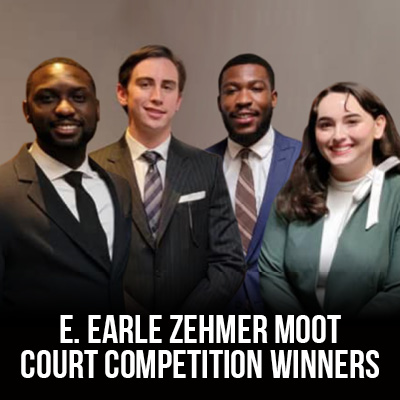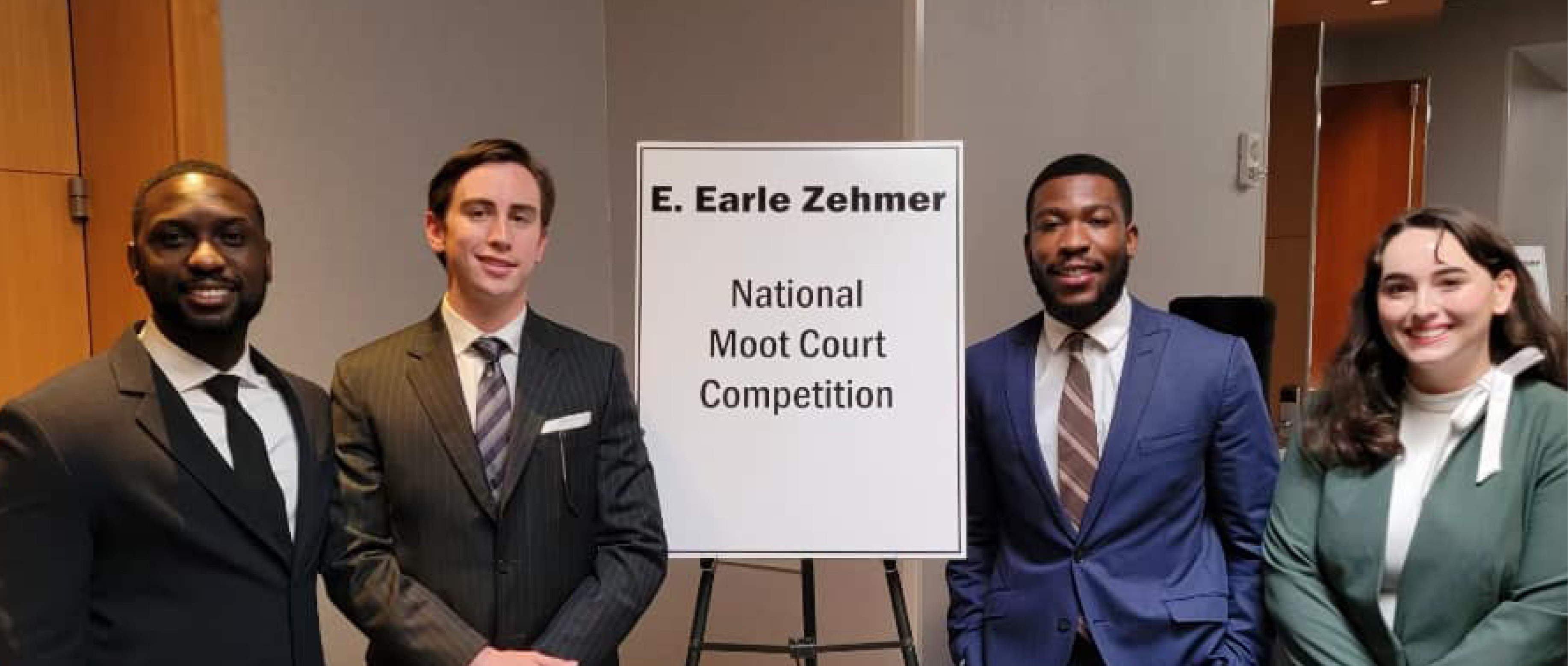Baylor Law Wins E. Earle Zehmer Workers’ Compensation Moot Court Competition


Baylor Law students Rhasean Stephens, Canon Hill, Will Onyeike, and Carisa Brawley at the E. Earle Zehmer Workers’ Compensation Moot Court Competition.
WACO -
For the third time in five years, Baylor Law’s Moot Court interscholastic team has clinched another national championship at the E. Earle Zehmer Moot Court competition held in Orlando. In a testament to the depth of talent of Baylor Law’s moot court teams, two Baylor Law teams advanced to the final round of the competition and faced off for the championship on Monday, August 21, 2022.
The team of Carisa Brawley and Will Onyeike placed first out of more than a dozen teams at the annual competition sponsored by the Florida Workers’ Compensation Institute, edging out the team of Canon Hill and Rhasean Stephens. Both teams were coached by Haley Owens, JD ’20, of the Hermes Law Firm in Dallas, herself a former member of Baylor Law’s highly successful interscholastic moot court team.
“I was so fortunate to get to work with this extraordinary group of students, and their commitment to their teams truly humbled me,” noted team coach Haley Owens, JD ’20. “Every one of them went above and beyond the call of duty, maintaining their dedication and positive attitudes even in the face of 40+ hour work weeks, full courseloads, final exams, job interviews, and Practice Court preparation.”
I know these four will go on to do amazing things, and I was lucky to be a small part of their Baylor journey.”
–Haley Owens, JD ’20
Attorney at Hermes Law and Team Coach
The Zehmer Competition is one of the country’s more unique moot court competitions for its complex issues and concepts designed to immerse law students in worker’s compensation law issues. The judges in the preliminary rounds are sitting judges, commissioners, and other adjudicators who hear workers’ compensation cases regularly. Sitting judges of the First District Court of Appeal of Florida judged the final round of the competition.
The competition involves writing a brief as either appellant or appellee and then arguing the case in front of a panel of judges. During the competition’s two qualifying rounds, students compete on ‘both sides’ of the matter – meaning they must argue at least once on behalf of the appellant and at least once as the appellee. This year’s winning team represented the appellant, Buncombe’s Universal Circus, and argued that the appellee was not entitled to worker’s compensation after sustaining an injury while practicing gymnastics because (1) the appellee was an independent contractor, not an employee, and also a performer and therefore exempt from worker’s compensation and (2) that the appellee did not have a calculable average weekly wage to use to calculate a worker’s compensation award, and even if he did, it would be set significantly lower than the amount set by the Judge of Compensation Claims.
This championship win in Florida follows another first-place finish by a Baylor Law moot court team at the Texas Young Lawyers Competition Moot Court Competition, held in conjunction with the State Bar of Texas Annual Meeting earlier this summer. Kristopher Ruiz, Gili Canales, brief writer Andrew Boone, their bailiff Tansy Ackermann, and their coach Professor Kathy Serr, took first place at the Texas Young Lawyers Association State Moot Court Competition. Members of the Texas Supreme Court judged the final round of the TYLA competition.
MEDIA CONTACT: Ed Nelson, Director of Marketing & Communications
EMAIL: Ed_Nelson@Baylor.edu
PHONE: 254-710-6681
ABOUT BAYLOR LAW
Established in 1857, Baylor University School of Law was one of the first law schools in Texas and one of the first west of the Mississippi River. Today, the school has more than 7,600 living alumni. It is accredited by the American Bar Association and is a member of the Association of American Law Schools. Baylor Law has a record of producing outstanding lawyers, many of whom decide upon a career in public service. The Law School boasts two governors, members or former members of the U.S. House of Representatives and the U.S. Senate, two former directors of the FBI, U.S. ambassadors, federal judges, justices of the Texas Supreme Court and members of the Texas Legislature, among its notable alumni. In its law specialties rankings, U.S. News & World Report ranked Baylor Law’s trial advocacy program as one of the top 5 in the nation. Baylor Law is also ranked in the top 50 in the magazine’s 2019 edition of "America’s Best Graduate Schools." The National Jurist ranks Baylor Law as one of the "Best School for Practical Training," and in the top 15 "Best Law School Facilities" in the country. The Business Insider places Baylor Law among the top 50 law schools in the nation. Baylor Law received the 2015 American Bar Association Pro Bono Publico Award, making it only the third law school in the nation to be honored with the award since the award’s inception in 1984. Learn more at baylor.edu/law
ABOUT BAYLOR UNIVERSITY
Baylor University is a private Christian University and a nationally ranked research institution. The University provides a vibrant campus community for more than 17,000 students by blending interdisciplinary research with an international reputation for educational excellence and a faculty commitment to teaching and scholarship. Chartered in 1845 by the Republic of Texas through the efforts of Baptist pioneers, Baylor is the oldest continually operating University in Texas. Located in Waco, Baylor welcomes students from all 50 states and more than 80 countries to study a broad range of degrees among its 12 nationally recognized academic divisions. Learn more at baylor.edu